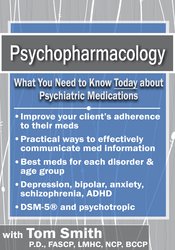Description
- Improve your clients’ adherence to their meds
- Practical ways to effectively communicate med information
- Best meds for each disorder & age group
- Depression, bipolar, anxiety, schizophrenia, ADHD
- DSM-5® and psychotropic med use
Most Up-To-Date Psychotropic Medication Info
Demands on mental health professionals to expand their knowledge of psychotropic meds are like never before . . . not only do you need to be on top of the latest developments and what is on the horizon, but you also have to take that information, and use it most effectively for your client.
- Improve clients’ understanding of their mental illness, and how medication aids recovery
- Identifying treatment concerns with inappropriate, inadequate doses of medication
- Tools to help clients manage unpleasant side effects
- Strategies to improve client adherence to medications
- Depression, bipolar, anxiety, schizophrenia, ADHD -- the latest trends in medication management
CPD
CPD
- PESI Australia, in collaboration with PESI in the USA, offers quality online continuing professional development events from the leaders in the field at a standard recognized by professional associations including psychology, social work, occupational therapy, alcohol and drug professionals, counselling and psychotherapy. On completion of the training, a Professional Development Certificate is issued after the individual has answered and submitted a quiz and course evaluation. This online program is worth 6.5 hours CPD for points calculation by your association.
Faculty
Tom Smith, P.D., FASCP, LMHC, NCP, BCCP, is a Doctor of Pharmacy, a Licensed Mental Health Counselor, a Nationally Certified Psychologist, and a Board Certified Clinical Counselor. He holds academic appointments at Butler School of Pharmacy and Health Sciences, the Saint Louis University School of Graduate Nursing, and the University of Phoenix. Tom is a Fellow of the American Society of Consulting Pharmacists.
Tom has spoken on Bipolar Disorder, the DSM-5®, and psychopharmacology throughout the United States, He is the author of Psychopharmacology Made Simple: A Primer, and he is internationally published on the topic of Aromatherapy.
Tom maintains an active private practice in Martinsville, Indiana, where he works with clients of all ages.
Speaker Disclosures:
Financial: Tom Smith maintains a private practice. He will address ‘off-label’ uses of commercial products. Mr. Smith is a speaker who receives an honorarium for PESI, Inc.
Non-Financial: Tom Smith is nationally published on the Americans with Disabilities Act and receives no compensation.
Objectives
- Articulate the clinical uses of the five major psychotropic medication classes-antidepressants, mood stabilizers, anti-anxiety agents, antipsychotics and psychostimulants- including their efficacy and their common side effects.
- Communicate the potential benefits and risks of using psychotropic medication to treat a wide array of conditions.
- Explore psychotropic medication treatment options for clients with Attention Deficit/Hyperactivity Disorder.
- Analyze the actions, therapeutic uses, and side effects of antidepressants in adults and children.
- Implement effective methods for collaborating with clients, families and prescribers in order to build a comprehensive treatment plan.
- Explore specific ethical issues and their resolve to the everyday practice of clinical psychopharmacology.
Outline
- Biological Psychiatry
- Neurotransmitters: The theoretical emotional signaling chemicals of the brain
- DSM-5® and Psychotropic Med Use Depression
- Antidepressants: How they are thought to work
- Cyclics
- SSRIs
- SNRIs
- Other common antidepressants – and why they are used
- Side effects and risk factors
- Herbals and depression
- Treatment-resistant depression
- Improving Patient Compliance with Mental Health Medications
- hat you and your clients should know
- Bipolar Spectrum
- Medicating Bipolar disorder
- Current “gold standard” treatment and side effects
- Anticonvulsant and antipsychotic use in Bipolar disorder
- Anticonvulsant side effects
- Risks of medication non-compliance
- New! Controversial concepts in treating Bipolar spectrum
- The Many Manifestations of Anxiety
- Medicating anxiety
- Benzodiazepines
- Non-benzodiazepines
- Medications used to treat insomnia
- Using anxiolytics safely
- Side effects of the anxiolytics
- Schizophrenia
- How antipsychotic medications are thought to work
- Conventional antipsychotics
- Second generation agents
- Antipsychotic side effects
- Relapse and non-compliance
- Controversy Surrounding Antidepressants in Treating Children and Adolescents
- Antidepressants and suicide in children: The real truth
- Medicating anxiety in children
- Disruptive mood dysregulation disorder – the new pediatric bipolar disorder?
- ADHD Medications – What’s New, What’s Old. Stimulants, Non-Stimulants, and some surprises!
- The evolution of psychostimulants
- Alzheimer’s Medications, Treatments, Theory and Controversy
- What’s Next: Newly Approved Mental Health Medications
Target Audience
Counselors, Nurses, Nurse Practitioners, Clinical Nurse Specialists, Social Workers, Psychotherapists, Psychologists, Case Managers, Marriage & Family Therapists, Addiction Counselors, School Psychologists, Pharmacists, Other Mental Health & HealthCare Professionals

